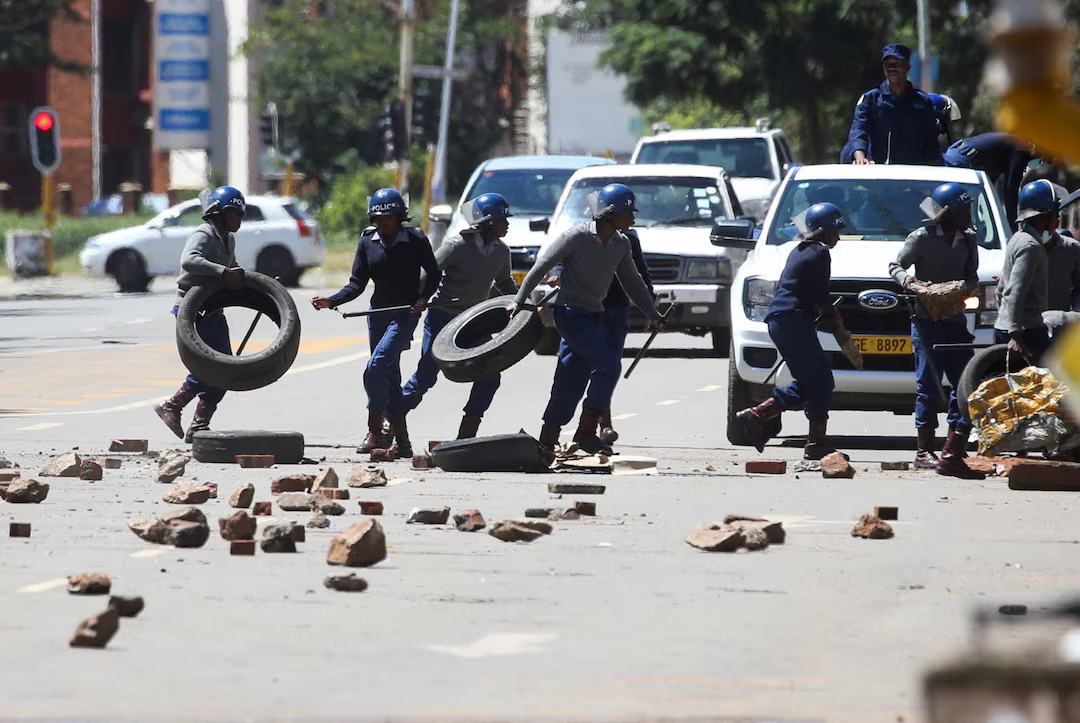The journalist Hopewell Chin’ono has been asked to remove a statement he published that announces representative statements of Vice President Constantino Chiwenga’s ex wife, Marry.
Marry Mubaiwa states that she is worried that her identity details have been used to hurt her welfare.
Hopewell Chin’ono was reached for comment earlier in April 2025, but did not respond.
The following was the brief interview-
Interviewer:
I’m sending it to you, so here is the picture, because it doesn’t make sense to me that someone announces like this and it’s not true. I’ll send it shortly. I’m gonna find it, yeah, yeah. I thought you met, because that’s what you said here — he said, “I met with Marry.”
Marry: I’ve never met him, so don’t even know him.
Interviewer: How is that possible? Investigative journalist? How do you—
Marry: Even if he becomes an investigative journalist I don’t know him. I’ve never spoken with him and he has never spoken with me.
Interviewer: Not that you’ve forgotten?
Marry: I’ve never.
Interviewer: 31 March, right?
Marry: Affirmation.
Interviewer: Weeks ago, I bumped into Marry Chiwenga at Health Point. She stopped me. She was with her family and a pastor.
Interviewer:
So he has actually — he’s actually got a quote of you:
Marry: according to him, he’s got a quote.
Interviewer: He is quoting you, saying this, ‘Mr Chin’ono- Why is it the media, women’s groups, and human rights organizations have not spoken for me?’” Close quote.
That question still haunts me to this very day.
Marry: You know what Simba; that quotation there of saying how come the women are not advocating on my behalf, isn’t it?
Interviewer: Yes rhat quotation, yes.
Marry: I wrote it.
Interviewer: On your Twitter?
Marry: It’s something I wrote down. Yes. It’s not a quote from a conversarion with this said- Hopewell.
It’s something that he got off from the internet, he didn’t get it from me, he didn’t get it from me.
Because I did say that. It’s something I authored, the same way I wrote things about my kids.
But — is this your Twitter account, that says Marry Mubaiwa Chiwenga— is that yours?
Marry: This time it’s written Mubaiwa, intended where it says Chiwenga.
Interviewer:
Okay. I’m just looking for it. And um — I’m just looking for it —
Marry: Yes do look. I removed where it says Chiwenga.
Interviewer:
Okay. So there is in 2023 — “I’ve been to hell and back.” Is that you?
“Our kids are growing and you’ve denied me the space to be a mother to them. You had hoped for me fo be dead by now. The silence by women that claim to be ambassadors of women’s rights abuse. The ignorance of our constitution…”
Marry: Affirmation
Yes.
Interviewer: I’ve seen this one here. But there’s also an interview that you did — that you did speak — or were outside. You just spoke with some journalists, where you also said the same. You used exactly the same words.
Interviewer:
So you’re saying he probably picked it — used the wording from those statements you made —
Marry: Yes.
Interviewer: And then he doctored those words and appeared as if?
Marry: AFFIRMATION.
Interviewer: Why. Why would he do this? What do you think is his gain? Because I’m not understanding that a whole journalist did this. I’m not understanding the purpose, and — and — and I’m — I also — sorry…
Marry: Maybe. He is on a mission of giving an impression that him and I have a personal relationship — which one day — his boss — Constantino will be able to use against me, of saying I was in a relationship with him.
Interviewer: Okay?
Marry: Can you see it?
Because then he needs to give the public an impression that — him and I would get along — can you see? That him and I we get along because — he will be then speaking of how close he is to me and he has been introduced to the family; Can you see?
Interviewer: Okay, to the family as well?
Marry: It won’t be anymore of saying we met at the hospital.
Interviewer: he will be mentioning saying I met the family. Can you see now?
Interviewer: So you suppose?
Marry: He will now be saying I met the family, it will not be twisted to appear like I introduced him to my family.
It will now mean that I was in a relationship with him and I introduced him to my family, so that they know him and that they meet him officially. So can you see? For his story- he is trying [to say] he is part of the family because I introduced him to my family. He will now be saying I introduced him he is now known by the family.
Interviewer: So you accuse him of taking your details your name familiar things about you?
Marry: Of course I do. I do because I don’t even know him, so definitely I do. He is using my name for something else but for what I don’t know. Every person who he meets with does he write and announce like this?
Interviewer: What would your message be to him?
Marry: What is his name by the way?
Interviewer: Hopewell Chin’ono.
Marry: Hopewell Chin’ono. You never met me. You have never spoken with me. I don’t know you. You don’t know me. I don’t even know you from a loaf of bread. I don’t know you at all. You don’t speak about me. I will not speak about you. We have nothing to offer each other. I don’t want anything at all from you. So stop using my name. Stop telling me that you know me. You don’t know me — and I don’t know you — and I would like to keep it that way. Thank you.
Interviewer:
I will not lie to you. This man Hopewell Chin’ono, before God I don’t know him. I don’t know him.
Interviewer: — you know, this is really frightening me now. It’s — it’s quite… I must say. And the thing is, what he has been saying online — even in interviews, even in my other documentary — Goldmafia, he is claiming that he has been all this while reporting alongside me, alongside our work, that we’ve been doing, serving people. And so, you seem to scare me now, that my fears — my fears are that what he’s doing — possibly — is taking people’s details, their names and everything. And so he uses the journalism name to gain trust, then he takes people’s names, their details, posts to the public, and then uses them for whatever you are accusing him now — that he is possibly doing other things. And that — that really scares me. It seems to scare me in a big way.
It scares me in a big way.
Marry: Yeah. Because I don’t know — I don’t know him.
Interviewer:
And — and another thing again, I also — I also don’t understand certain people — why — I won’t mention names here — who started then telling me that I shouldn’t be talking to you. And — and — the type of language that was being used there suggested to me — it strongly suggested — that it is Hopewell himself who doesn’t want me to phone you, to talk to you.
Perhaps maybe so that this truth is not known — so people don’t know — or don’t get to discover — that you never had a conversation with him; That he actually used your private details — your name — familiar things about you — for the purposes that you are now describing. You now fear that he has been using them for whatever purposes.
Marry: AFFIRMATION. Because he is someone who doesn’t seem to have a conscience.
Interviewer:
Interviewer: you’re actually being quoted right here.
Marry: Huh. He took those things. He took them, you know it is just like a quote I had out in my Facebook which people loved, someone can just take that and then claim that they called with me. They won’t declare that they plucked it off, they will say that they were talking to me she. She mentioned this.
Marry: So it will now appear as if we were exchanging a conversation; so this Hopewell I am sure that is what he will be doing, he looks for me and he plucked out what I will have written down, and then he relates to me, Marry said this and this when I have not spoken with him at all. I think…
Interviewer: You know what scares me right now Marry, is that Hopewell has some long-standing allegations of identity theft, that he has been stealing people’s details since the 90s. That’s how he made money. Through identity and cheque and credit card fraud, then he uses the journalism name title to cover up what he is doing,
Marry: Yes.
Interviewer: So you seem to give me a scare there — that he is possibly doing something way more sophisticated than we think — once again, taking your details— so if he has a conversation or even a phone call — but in this case, never even a phone call, I mean if it was me talking to you, but he has never and your phone number is not complicated to find.
Marry: Yeah
Interviewer: But he is not interested in wanting to find the truth. Because he could have easily had a phone conversation with you. And then maybe twisted it — at least he would have had a conversation with you, right?
Marry:
Yes.
Interviewer:
But you’d never even had any conversation — even over the phone — which he could have easily had if,
Marry: None at all:
Interviewer: And you know, if he was someone practicing real journalism, he could have at least obtained something — or even a “hello” from you — and said, “I spoke to Marry.” But you’re saying he never did that.
Marry: Yes. No never
Interviewer:
And this seems to throw so much weight over what Hopewell has long been accused of — stealing people’s IDs, identity details, and a lot of things about them — familiar data — to use that for… beginning with check fraud. And yeah — and of course this is a different area.
But it just seems too coincidental — that it is the same person. The same person who couldn’t account for how he bought the money that he financed for his first home. He acquired in Chisipite, in ’96. ’96 to 2004 — that he contradicted himself.
And now, this time, the same person — having failed, and having contradicted his own wealth account — over serious allegations of data and identity theft — is the same person now who is — what? Who is making statements where he has taken other people’s details — like your details — and used your name, and imposed his own quote, and claimed that he spoken with you, and made representations about you, of you.
Marry: Yeah yeah!
Interviewer: You’ve frightened us today. You’ve frightened us.
Marry: But the person is someone who lies. As of me I don’t know him but from what you’re telling me he is someone who lies. He is a very good liar.
Like this:
Like Loading...







































































































